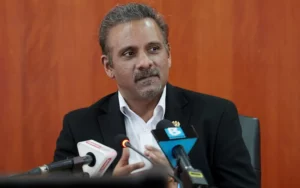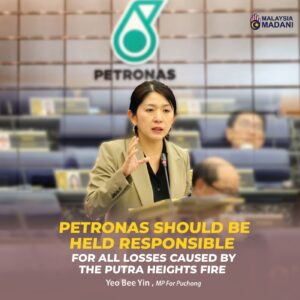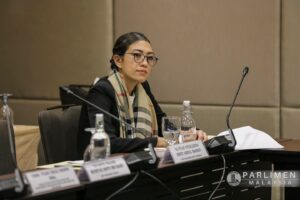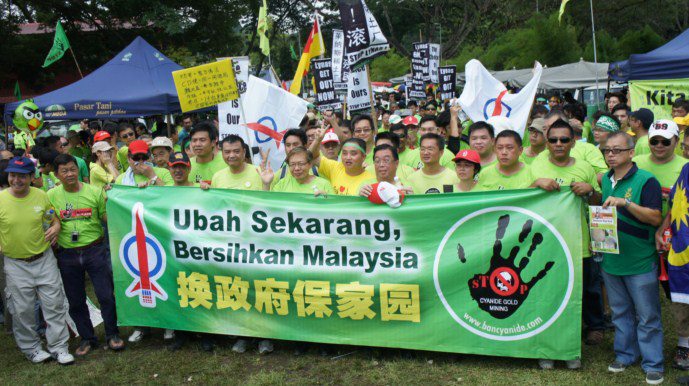
The 2008 political quake landed two punches to Najib’s home state, Pahang when Pakatan won a historic two parliamentary seats here. Will the next general election spring a surprise for the observers? Pahang DAP state chairman Leong Ngah Ngah and state secretary Choong Siew Onn shared on what may just tilt the situation to Pakatan’s favour with T.K Tan from the Rocket
Poisoning The People
Prime Minister Dato Seri Najib Tun Razak’s sleepless nights for his and BN’s political survival are not limited to other states alone. Pahang seems to have caught the change bug as well these days, not thanks to the litany of issues plaguing it.
Tras ADUN and DAP state secretary Choong Siew Onn believes that the people’s awareness of current affairs have increased.
 “The galore of corruption and malpractice issues in Pahang have opened their eyes to the rotten state of affairs in the state. Issues such as the Lynas, Bukit Koman, Seruan Gemilang and many more are hogging the headlines for the wrong reasons,” Choong (left) began.
“The galore of corruption and malpractice issues in Pahang have opened their eyes to the rotten state of affairs in the state. Issues such as the Lynas, Bukit Koman, Seruan Gemilang and many more are hogging the headlines for the wrong reasons,” Choong (left) began.
In particular, two toxic cases had alarmed the people to an extent not seen since the Emergency in 1950s. The first, cyanide poisoning from gold mining in Bukit Koman in Raub has already gotten under many people’s skin, literally.
Choong showed his disappointment with the government when talking about the Bukit Koman mass poisoning incident. “The health ministry has announced that more than 200 persons affected by the fouled air quality issue there. More than 60 people have exhibited skin diseases and irritations and breathing difficulties.”
“A preliminary environmental impact assessment report on the Bukit Koman was published in 1997 and not even made widely available for public scrutiny.”
“Some of the residents have spent thousands of ringgit to treat their conditions, many with no improvement still. In some cases whole families are suffering from related conditions the air pollution. Besides Bukit Koman, other surrounding areas such as Simpang Kallang, Sungai Lui and Sempalit are also affected by the cyanide poisoning to some extent. The government has to resolve this issue urgently. Lives are affected here.”
“Other area such as Penjom in Kuala Lipis has also reported cases of residents and miners affected with cancer, whereby cyanide usage in the mining of gold there suspected to be the cause of their ailments. Even nearby Selinsing in Raub district is reportedly also using cyanide to extract the gold ore,” he explained.
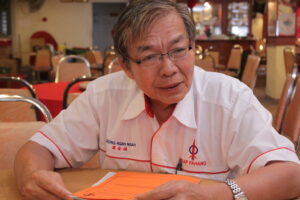 Triang ADUN and DAP state chairman Leong Ngah Ngah (left) explains that Pakatan is not against not against gold mining; however there are several issues at stake. “The usage and discharge of cyanide to extract the mineral is causing health problems to the people In addition, the gold mine is too close to the residents’ houses,” Leong elaborated.
Triang ADUN and DAP state chairman Leong Ngah Ngah (left) explains that Pakatan is not against not against gold mining; however there are several issues at stake. “The usage and discharge of cyanide to extract the mineral is causing health problems to the people In addition, the gold mine is too close to the residents’ houses,” Leong elaborated.
The other big toxic issue, the Gebeng Lynas rare earth refinery has been headline news since 2008. “The refinery is too close to the residents’ houses and its safety is questionable. We have seen cases of rare earth factories poisoning the surrounding environment catastrophically in China.”
“The government don’t seem to be concerned with the people’s health and wellbeing. The people are not protesting without reasons here. We have to take into account the people’s views.”
“If PR takeover Pahang, we will stop the cyanide usage in the mines. The mines will be allowed to continue if it complies with the proper environmental recommendations. DAP national secretary general Lim Guan Eng has reiterated PR will close down Lynas if it comes to power,” he expounded.
Selling Their Future
Why is the state government allowing so many hazardous industries to be set up in Pahang? In part, its because of the state’s dry coffers. In a word, finances.
According to the Harakah Daily website, the state government has been running 13 consecutive years of budget deficits. As of 2010, its debt currently stands at RM 2.281 billion, third highest in the country.
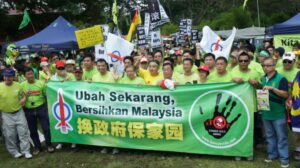 Pahang Menteri Besar Adnan Yaakob has been reported as saying that “it is impossible for the state to cover its development expenditure without the federal government’s help.”
Pahang Menteri Besar Adnan Yaakob has been reported as saying that “it is impossible for the state to cover its development expenditure without the federal government’s help.”
To his statement, Leong retorts: “Pahang is a state rich with natural resources; yet the state government can’t keep a balanced budget for even a single year in the last 13 years. Evidently it is due to the mismanagement of the state’s resources that has got us to this stage.”
“Kelantan, which is also rural and covered largely with forests and has been denied much federal funds for development for years now has managed just as well. Much of Pahang’s revenue comes from land premium and timber royalties. The state doesn’t need to attract dangerous and hazardous industries such as the cyanide gold mining and rare-earth refinery,” Leong criticised.
“We have to cut down on wasteful spending. By going for more transparent practices such as implementing open tenders for government projects and accountable administration policies, we can reduce the state’ expenditure. Despite Najib’s transformation programs being announced with much fanfare, his own home state has yet to see much changes.”
“The list of wasteful spending and white elephant projects are spread across the state. In Bentong there is a car park that was built in 2005 but was demolished later without ever being used, costing RM 3.6 million to the state; in Bera there is a waterfront project that floods when it rains heavily. The list is growing by the day.”
Although Pahang is a large state covered with forest, much of it is gazetted as catchment area for water usage by other states. Harakah Daily has also reported that the state’s forest is valued at RM 28 billion.
Choong estimates that between 6 to 20 percent of the state’s forest is available for logging. “With open and transparent tender bidding, we can fetch enough revenue to pay off our bills and still make the necessary development,” Choong added. -The Rocket
